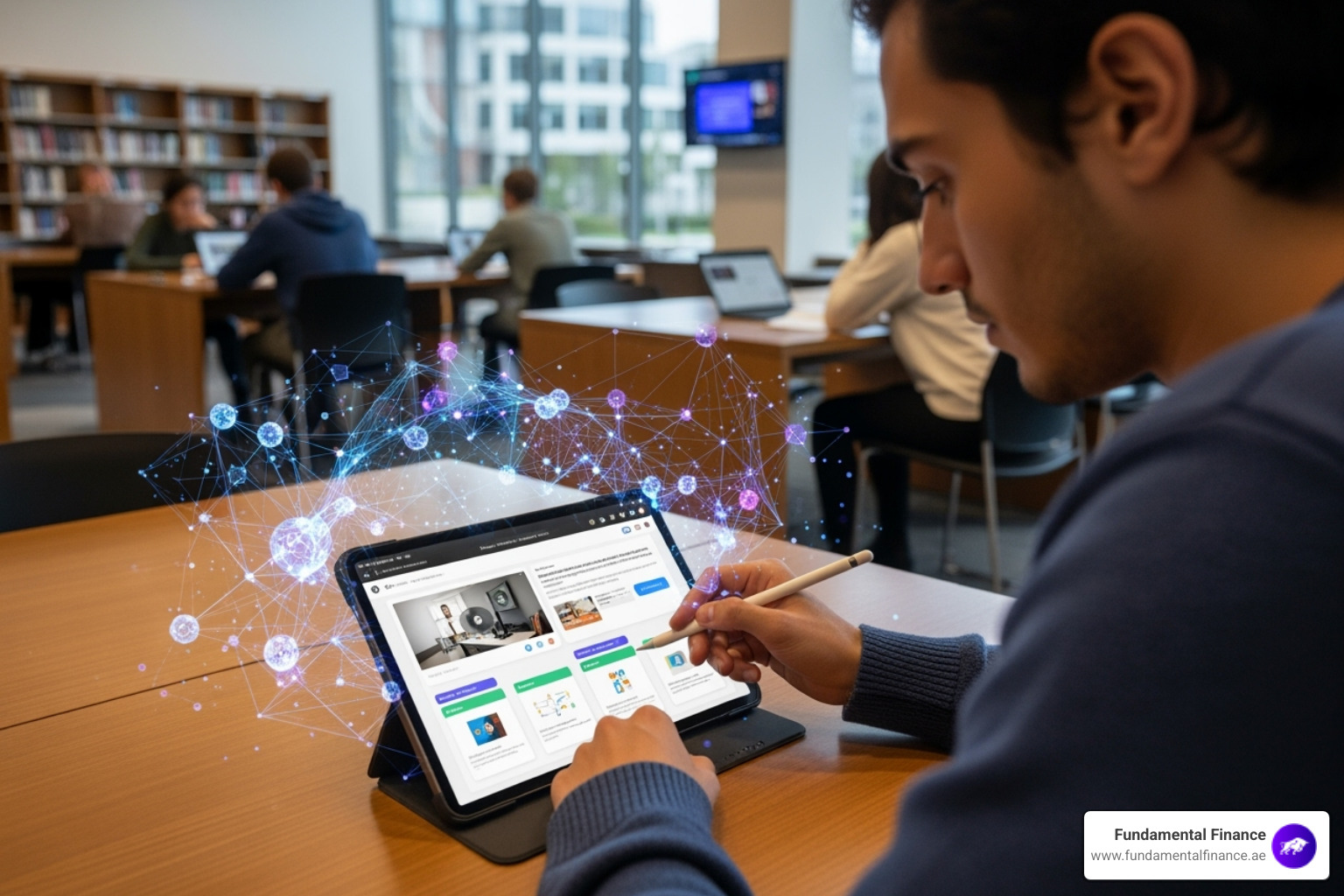
Understanding AI's Revolutionary Impact on Modern Learning
AI powered education is changing learning and teaching with intelligent systems that personalize experiences, automate administrative tasks, and provide real-time feedback. This technology adapts to individual learning styles, creates custom content, and helps educators focus on meaningful student interaction.
Key Applications of AI in Education:
- Personalized Learning: Adaptive platforms that adjust content difficulty and pace based on student performance
- Intelligent Tutoring: 24/7 AI tutors that provide step-by-step guidance and instant feedback
- Administrative Automation: Automated grading, scheduling, and report generation to save teacher time
- Accessibility Support: Speech-to-text, visual recognition, and tools for students with special needs
- Content Creation: AI-generated lesson plans, quizzes, and educational materials
- Assessment Analytics: Real-time tracking of student progress and identification of learning gaps
Teachers can save up to 8 hours per week using AI tools, while students show an 85% preference for regular AI tutoring sessions. A McKinsey report suggests AI could reduce the average 11 hours of weekly teacher preparation time to just six hours.
As one student shared about their AI tutor experience: "I can ask constant questions without it being annoyed, and it greatly surpasses a human tutor at times." Another noted the AI tutor's "infinite patience and knowledge of every subject."
Schools are using AI for everything from detecting learning disabilities early to creating immersive virtual field trips. However, challenges remain around data privacy, algorithmic bias, and maintaining the essential human connection in education.

How AI is Revolutionizing the Student Learning Experience

Imagine a classroom where lessons are customized for each student, learning barriers disappear, and feedback is instant. This isn't a distant dream—it's happening now through AI powered education. These intelligent systems reshape learning by creating truly personalized, accessible, and engaging educational experiences.
The Core of AI powered education: Personalized Learning Paths
In a traditional classroom, students learn at the same pace, leaving some bored and others behind. AI powered education changes this by creating individualized content that adapts to each student's learning style. By analyzing student performance, these platforms provide real-time adaptation—adjusting difficulty, offering new explanations, or providing extra practice when needed. For example, a math app might focus on fractions for a student who struggles with them while accelerating through geometry. This student-paced learning ensures no one is left behind or held back.
At Fundamental Finance, we've seen this in action through our FunFi app. Our AI assistant Toro helps users learn budgeting and Islamic finance concepts at their own pace, making complex financial topics approachable. The gamification elements keep learners engaged while AI ensures they're always challenged at the right level. You can find more info about gamified learning and how it transforms education.
Enhancing Accessibility and Supporting Special Needs
AI shines at breaking down long-standing educational barriers. AI powered education creates inclusive lessons that work for every student, regardless of their challenges or abilities.
Assistive technologies like speech-to-text software help students with hearing difficulties, while visual recognition tools describe images for those with visual impairments. These tools are opening doors to education that were previously closed. AI can also detect learning differences like dyslexia detection by analyzing reading patterns. This early identification helps students get the support they need before they fall behind.
The beauty of AI is that it provides this support naturally, without singling anyone out. When a student uses a tool that works for their learning style, it's just part of their normal learning experience. This creates true equitable access where every student can succeed. Learn more about these powerful AI tools for special education and their impact.
Improving Assessment and Feedback
AI is revolutionizing assessment, making feedback immediate, detailed, and helpful. Formative assessment through AI means teachers can see how students are doing in real-time. As students work, AI provides instantaneous feedback, catching mistakes immediately and offering gentle corrections.
Automated grading handles routine work, but modern AI can also evaluate essays, provide feedback on writing style, and detect plagiarism while helping students understand proper citation. This frees up teachers to focus on meaningful conversations about learning.
The real magic is with performance analytics. AI can spot patterns that humans might miss, like a student who struggles with word problems but excels at calculations. This skill gap identification helps teachers provide the right support at the right time.
Fostering Critical Thinking and Future-Ready Skills
When AI can answer any question, teaching students how to think becomes more important than what to think. AI powered education is uniquely positioned to develop these crucial problem-solving skills.
Virtual labs and real-world simulations let students experiment and learn without real-world consequences. This hands-on learning develops AI literacy—understanding how to use AI tools and when to think critically about their outputs. Interdisciplinary learning also becomes natural when AI connects concepts across subjects.
At Fundamental Finance, we believe financial literacy is a critical future-ready skill. Our AI-powered approach helps users understand everything from budgeting to Islamic finance through practical scenarios. When you can manage your money wisely, you're prepared for the future. Explore how we're using AI to learn about finance in innovative ways.
The goal isn't to create students who depend on AI, but students who can work with AI while maintaining their uniquely human abilities to think creatively and solve complex problems.
Empowering Educators: The Benefits of AI powered education

While much of the excitement around AI powered education focuses on students, its impact on educators is equally life-changing. AI acts as the ultimate teaching assistant, handling tedious tasks so teachers can focus on what they do best: inspiring, mentoring, and connecting with students. AI isn't here to replace teachers, but to empower them.
Automating Administrative and Repetitive Tasks
AI powered education helps teachers focus on teaching, not paperwork. According to a McKinsey report, AI can cut the average 11 hours of weekly teacher preparation time to just six hours. Automated grading is a major time-saver, but AI also tackles lesson planning by generating activities and assessments. It can create a rubric in 15 minutes instead of an hour.
AI also helps with scheduling, managing student records, and parent communication through language translation. School principals are using AI to draft emails and organize schedules, freeing them up for leadership work. You can read more about How AI helps with busywork. Report generation becomes a breeze as AI pulls together student data into comprehensive progress reports.
Creating and Supplementing Educational Content
AI can be a creative partner for teachers, helping generate fresh ideas and make lessons more engaging. Generating lesson plans is where AI shines, creating comprehensive plans from simple topics. It can also make creating quizzes almost effortless and help with differentiating instruction by adapting a single lesson for various learning levels.
AI excels at creating visual aids and interactive materials, like infographics and presentations. This allows teachers to provide high-quality materials without spending hours on graphic design. Teachers maintain creative control while AI handles the heavy lifting. Find more about AI tools for lesson planning to see how educators are changing their practice.
AI's Role in Professional Development
AI is also revolutionizing professional development for educators, offering the same personalized learning that students receive. Personalized learning for teachers means AI can recommend courses and resources based on individual goals. Instead of irrelevant workshops, professional development becomes truly useful.
AI can suggest the latest research and tools for specific subjects and grade levels. Analyzing teaching practices is another interesting application, where AI can provide valuable insights into classroom dynamics. Virtual coaching offers a safe space to practice new strategies, and collaborative platforms can connect educators with peers worldwide.
At Fundamental Finance, we understand the power of AI in education. Our FunFi app uses AI (meet Toro!) to help users learn essential financial skills through gamified experiences. This shows how AI can make complex topics like Islamic finance and budgeting both accessible and engaging.
The future of teaching looks brighter with AI as a partner, allowing teachers to focus on what drew them to education: inspiring the next generation.
Navigating the Challenges and Ethical Landscape of AI

AI powered education has exciting benefits, but it also presents real challenges. Implementing AI responsibly requires navigating complex issues like student privacy, fairness, and implementation costs. These aren't roadblocks but important considerations to ensure AI benefits everyone.
Addressing Data Privacy and Security
A key concern is what happens to student data. As AI systems personalize learning, they collect vast amounts of information on student performance and learning patterns. Student data protection must be the top priority. Institutions must follow strict guidelines like FERPA and COPPA, using secure infrastructure and data encryption to protect student information.
Transparency is critical. Schools need to be upfront with families about what data is collected and why. User consent should never be an afterthought. Google has set a good example with their commitment to Responsible AI practices, showing how tech companies can prioritize privacy.
Ensuring Fairness in AI powered education: Mitigating Bias
AI can be biased, which is a major problem in education. Algorithmic bias happens because AI learns from data, and if that data reflects existing inequalities, the AI will too. For example, some AI systems have been found to misclassify writing from non-native English speakers as AI-generated.
Schools must fight this by using diverse data sets and regularly auditing AI tools for bias. The digital divide is another piece of the puzzle—if some students lack access to technology, AI could widen the gap instead of closing it. The goal is to use AI thoughtfully, involving diverse voices in choosing and testing tools. For practical guidance on Handling AI in schools, educators can find helpful resources.
Managing Costs and Implementation Problems
Implementation costs for AI can range from affordable monthly subscriptions to tens of thousands of dollars for comprehensive systems. Beyond software, schools need robust technology infrastructure, including reliable internet and compatible devices. Teacher training is also crucial, as even the best tool is useless if teachers don't know how to use it effectively. Resistance to change is natural, and schools must also consider scalability to ensure an AI solution can grow with their needs.
Upholding Academic Integrity and Social-Emotional Learning
There's a gap in AI adoption: nearly half of students have tried AI writing tools, while 71% of teachers have not. Plagiarism concerns are valid, but banning AI isn't the answer. Instead, we must teach students about critical thinking vs. cheating by designing assignments that require personal insight and creativity.
Most importantly, we must preserve the role of the teacher in providing human connection and mentorship. Only 22% of students believe their teachers try to understand their lives outside school. AI should free teachers to focus more on social-emotional development, not less.
At Fundamental Finance, we've seen how AI can improve human connection. Our AI assistant Toro helps users learn financial concepts, but the real magic happens when they apply those skills in real-world conversations. The goal is to use AI so teachers can spend more time on what only humans can do: building relationships and showing empathy.
Frequently Asked Questions about AI in Education
Can AI completely replace human teachers?
Absolutely not! This is a critical question, and the answer is clear. The U.S. Department of Education has rejected the idea that AI could replace educators. Think of AI powered education as a powerful assistant, not a replacement for the irreplaceable human touch.
While AI can handle administrative tasks, provide instant feedback, and offer 24/7 tutoring, it can't replicate what makes teachers special. Educators mentor, inspire creativity, and build the crucial relationships that help students thrive. AI lacks the emotional intelligence to know when a student is having a tough day or the intuition to adapt a lesson on the fly. That human connection is essential for social-emotional development.
AI's true value is in freeing teachers from mundane tasks, giving them more time to connect with students, provide personalized guidance, and create those "lightbulb moments" that no algorithm can replicate.
How can schools develop effective policies for AI use?
Developing effective AI policies requires thoughtful planning and collaboration. The key is stakeholder involvement, bringing together teachers, administrators, students, parents, and tech experts to shape policies together.
Schools need clear guidelines on how AI tools can be used, covering academic integrity, data handling, and ethics. Ethical frameworks should be the foundation, prioritizing student well-being, fairness, and transparency. Schools must also tackle algorithmic bias to ensure AI doesn't disadvantage certain student groups.
Strong data governance is essential. Schools need policies for how student data is collected, stored, and protected, following privacy laws like FERPA and COPPA and being transparent with families. Since AI technology evolves quickly, policies need regular reviews and updates.
Most importantly, student safety must come first. This includes teaching AI literacy so students understand both the capabilities and limitations of AI.
What is the future of AI in education?
The future of AI powered education is incredibly exciting. We're just scratching the surface of what's possible, with learning experiences becoming so personalized they feel like having a private tutor who knows you perfectly.
Hyper-personalization is a key trend. Future AI will understand a student's mood, learning style, and predict what they need to learn next. Immersive learning through VR and AR will transform classrooms, allowing students to walk through ancient Rome or conduct virtual science experiments.
Predictive analytics will become more sophisticated, helping teachers spot students who might struggle before it becomes a problem. We're also moving toward lifelong learning companions—AI tutors that grow with you from kindergarten through your career. Global classrooms will break down language and distance barriers, allowing students to collaborate with peers worldwide.
The UAE is already leading this charge, actively integrating AI into education to prepare students for the future. You can read more about AI in UAE education.
At Fundamental Finance, we're excited to be part of this future with our FunFi app, which uses AI to make financial literacy engaging. The best outcomes happen when technology serves human learning, not the other way around.
Conclusion
As we've explored AI powered education, it's clear this is more than a tech trend. It's a fundamental shift in learning and teaching that's already changing lives.
We've seen how AI creates personalized learning paths, makes education more accessible, and provides instant feedback to help students grow. For educators, AI is a powerful assistant that handles tedious tasks, allowing them to focus on what they do best—inspiring and connecting with students.
However, the journey has challenges. Data privacy concerns, algorithmic bias, costs, and academic integrity must be addressed thoughtfully by keeping humans at the center of AI implementation.
What's most exciting is that AI isn't replacing teachers. It's freeing them up for more meaningful conversations, creative problem-solving, and those "aha!" moments that make learning magical. It's about augmenting human potential, not replacing it.
At Fundamental Finance, we're thrilled to be part of this educational revolution. Our FunFi app uses our friendly AI assistant Toro to make financial literacy fun and engaging through gamified learning. We're helping people master essential money skills like budgeting and Islamic finance—because understanding money is one of the most practical life skills anyone can learn.
The future of education is collaborative, where AI and humans work together to create learning experiences that are more personalized, accessible, and effective than ever before.
Ready to experience AI-powered learning firsthand? Find how our innovative approach can transform your financial future by exploring our Learn more about financial literacy tools.
.avif)
Get Early Access
to Our Mobile App
Be among the first to explore FunFi, designed to make mastering money simple, practical, and fun!

.avif)